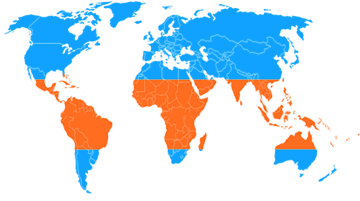Tropical crops include rubber tree, tropical food crops, bio-fuel crops, oil-bearing crops, tropical fruits and cash crops and so on, among which natural rubber from rubber tree is crowned as one of the “four industrial raw materials” together with steel, petroleum and coal; oil palm is known as “King of oil crops in the world”; cassava is the staple food crop for many developing countries and is also a bio-fuel crop; sugarcane is a main sugar crop; coffee and cocoa are listed as the second and third leading beverages after tea; banana is the largest tropical fruit in terms of consumption. Most developing countries are homed in tropical areas, and tropical agriculture plays an important role in global economy and society, serving the important objective of eliminating global hunger and poverty, and ensuring food security.
Tropical crops with various species and wide uses have great market potential. It is the main source for agricultural economy and farmer income in tropical world. China's tropical area referred to the tropical and south subtropical parts covers 500 000 km2, about 5% of China’s land total, distributed in Hainan, Guangdong, Guangxi, Yunnan, Fujian, Hunan, Jiangxi, Sichuan, Guizhou and Taiwan, homed by 170 million people, 13% of China's national population.
For developing production and processing technology of tropical agriculture, Chinese Academy of Tropical Agricultural Sciences (CATAS) was established in 1954. As the only national tropical agricultural research organization directly under the Ministry of Agriculture, PRC, CATAS carries out fundamental and applied researches on tropical agricultural sciences, enjoying comparatively high popularity for scientific research on tropical agriculture both at home and overseas, especially in the fundamental research fields such as researches on rubber, cassava and banana. It affords technology support for tropical agricultural development in China. At the same time, for helping tropical developing countries to improve their agricultural productivity, CATAS actively participates in the “South-South Cooperation”, carrying out a series of projects offering technical assistance and personnel training, such as construction of China-The Republic of Congo Agricultural Technology Demonstration Center and holding 60 international training courses on production and processing technologies of tropical agriculture for about 2000 participants from over 100 developing countries since 1984, and commissioned over 60 experts to more than 20 countries for providing technological assistance on the spot.
CATAS, with its 14 research institutes and 4,600 staff, would like to share knowledge and technology with colleagues and friends at home and abroad, with an aim to develop the capacity of tropical agriculture innovation world about, which is believed to be beneficial to world efforts for eliminating hunger and poverty and for developing a harmonious and prosperous world community with sustainable development endeavor.
Tropical crops with various species and wide uses have great market potential. It is the main source for agricultural economy and farmer income in tropical world. China's tropical area referred to the tropical and south subtropical parts covers 500 000 km2, about 5% of China’s land total, distributed in Hainan, Guangdong, Guangxi, Yunnan, Fujian, Hunan, Jiangxi, Sichuan, Guizhou and Taiwan, homed by 170 million people, 13% of China's national population.
For developing production and processing technology of tropical agriculture, Chinese Academy of Tropical Agricultural Sciences (CATAS) was established in 1954. As the only national tropical agricultural research organization directly under the Ministry of Agriculture, PRC, CATAS carries out fundamental and applied researches on tropical agricultural sciences, enjoying comparatively high popularity for scientific research on tropical agriculture both at home and overseas, especially in the fundamental research fields such as researches on rubber, cassava and banana. It affords technology support for tropical agricultural development in China. At the same time, for helping tropical developing countries to improve their agricultural productivity, CATAS actively participates in the “South-South Cooperation”, carrying out a series of projects offering technical assistance and personnel training, such as construction of China-The Republic of Congo Agricultural Technology Demonstration Center and holding 60 international training courses on production and processing technologies of tropical agriculture for about 2000 participants from over 100 developing countries since 1984, and commissioned over 60 experts to more than 20 countries for providing technological assistance on the spot.
CATAS, with its 14 research institutes and 4,600 staff, would like to share knowledge and technology with colleagues and friends at home and abroad, with an aim to develop the capacity of tropical agriculture innovation world about, which is believed to be beneficial to world efforts for eliminating hunger and poverty and for developing a harmonious and prosperous world community with sustainable development endeavor.


